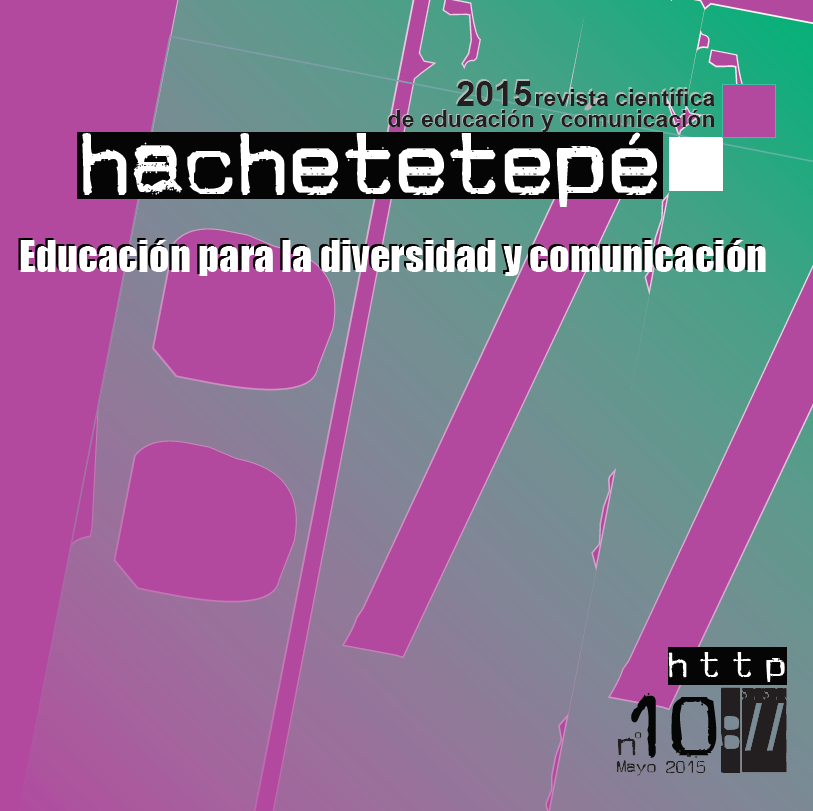"This child has special educational needs, although now it's called inclusion." Careful! Language shapes thought

Info
Abstract
Words are loaded with meaning. They have experienced an evolution over time and this makes it has semanticized. A study that invites reflection about people and the relationship we have with the language. A contribution to diversity, with the intention of opening the thought. An exercise to refresh the terminology and think about the present, contemporary. One way to think about “education for everyone ". Sheltered by Rome project, research is opened to ideas and reflection in continuous construction, because its purpose is to improve family, school and social contexts, from democratic coexistence, mutual respect and autonomy, personal, social and moral.
Keywords
Downloads
How to Cite
License

This work is licensed under a Creative Commons Attribution-NonCommercial-NoDerivatives 4.0 International License.
Those authors who have published with this journal, accept the following terms:
- They will retain their copyright and guarantee the journal the right to first publication of their work, which will simultaneously be subject to the Creative Commons Attribution License . They may be copied, used, disseminated, transmitted and publicly displayed, provided that the authorship, url, and magazine are cited, and are not used for commercial purposes. No derivative works are allowed.
- They may adopt other non-exclusive license agreements for the distribution of the published version of the work (e.g., deposit it in an institutional telematic archive or publish it in a monographic volume) provided that the initial publication in this journal is indicated.
- Disseminate your work through the Internet (e.g., in institutional telematic archives or on your website) once the manuscript is accepted, which may lead to interesting exchanges and increased citations of the published work. (See The effect of open access).
Hachetetepé. Scientific journal of education and communication does not charge a fee for the submission of manuscripts or for the publication of its articles.
References
Ainscow, M. (2004). Desarrollo de escuelas inclusivas. Ideas, propuestas y experiencias para mejorar las instituciones escolares. Madrid: Narcea.
Barton. L. (2008). Superar las barreras de la discapacidad. Madrid: Morata.
Bruner, J. (1990). Actos de significado. Más allá de la revolución cognitiva. Madrid: Alianza.
Bruner, J. (1997). La educación, puerta de la cultura. Madrid: Aprendizaje-Visor.
Cole, M. (2004). Psicología cultural. Madrid. Morata.
Darling-HammonD, L. (2001). El derecho de aprender. Crear buenas escuelas para todos. Barcelona. Ariel.
Fraser, N. y Honneth, A. 2006): ¿Redistribución o Reconocimiento? Madrid: Morata.
Freire, P. (1970). Pedagogía del oprimido. Montevideo: siglo XXI.
Freire, P. (1990). La naturaleza política de la educación. Cultura, poder y liberación. Madrid: Paidós. MEC:
Freire, P. (1993). La pedagogía de la esperanza. Madrid: Siglo XXI.
García de Vinuesa, F, González Pardo, H. y Pérez Álvarez, M (2014): Volviendo a la normalidad. La invención del TDAH y del trastorno bipolar infantil. Alianza-Editorial: Madrid.
Gardner, H. (1995). Inteligencias múltiples. La teoría en la práctica. Barcelona: Paidós.
Gould, S.J. (1987). La falsa medida del hombre. Barcelona: Orbis.
Habermas, J. (1999): La inclusión del otro. Barcelona: Paidos.
Habermas, J. (2002): Acción comunicativa y razón sin trascendencia. Paidós: Barcelona
Habermas, J. (2002): El futuro de la naturaleza. Paidós: Barcelona.
Harwood, V (2009): El diagnóstico de los niños y adolescentes problemáticos. Una crítica a los discursos sobre los trastornos de la conducta. Morata: Madrid.
Kemmis, St. y R. McTaggart. (1988). Cómo planificar la investigación-acción. Barcelona: Alertes.
Kozulin, A. (2000). Instrumentos psicológicos. La educación desde una perspectiva sociocultural. Barcelona: Paidós.
Kozulin, A. (2001). La psicología de Vygotsky. Madrid: Alianza.
López Melero, M. (2003): El Proyecto Roma: una experiencia de educación en valores. Aljibe: Málaga.
Lewotin, R. y Rose, S. (1990) No está en los genes. Barcelona: Grijalbo.
López Melero, M. (2004). Construyendo una escuela sin exclusiones. Una forma de trabajar con proyectos en el aula. Málaga: Aljibe.
López Melero, M (2012) “Disability and Education: Transforming difficulties into possibilities. En: Paraskeva, J. y Torres Santomé, J. (Eds.). Globalisms and Power: Iberian Educational and Curriculum Policies. New York: Peter Lang. Internacional Academia Publishers.
López Melero, M. (2013). “Discriminados pelo currículo por sua desvantagem: estratégias do currículo para uma inclusão justa e factível”. En: Gimeno Sacristán, J. (Org.): Saberes e incertezas sobre o currículo. São Paulo: Penso Editora; 385-402.
Luria, R.A., Lontiev, A.N. y Vygotsky, L. (1986): Psicología y Pedagogía. Madrid: Akal.
Luria, R.A. (1997): Desarrollo histórico de los procesos cognitivos. Madrid: Akal.
Luria, A. R. (1974). El cerebro en acción. Barcelona: Fontanella.
Maturana, H. (1994). El sentido de la humano. Santiago de Chile: Dolmen.
Maturana, H. (1994). Maturana, H. y Nisis, S. (1997). Formación Humana y capacitación. Santiago de Chile: Dolmen.
Maturana, H. (2003): Amor y Juego: Fundamentos olvidados de lo humano. Desde el patriarcado a la democracia. Santiago de Chile: Ed. JC. Sáez Editor.
Ovejero Bernal, A. (2003): La cara oculta de los tests de inteligencia. Un análisis crítico. Madrid: Biblioteca Nueva.
Proust, M. (1997): En busca del tiempo perdido. Madrid: Alianza.
Rosenthal y Jacobson (1980): Pygmalion en la escuela. Madrid: Marova (publicado en inglés en 1968).
Scribner, S. y Cole, M. (1981): The psychology of literacy, Cambridge: Harvard University Press.
Slavin, R. (1996). Education for all. Lisse: Swets y Zeitlinger
Slee, R. (2012): La escuela extraordinaria. Exclusión, escolarización y educación inclusiva. Madrid: Morata.
Stenberg. R.K. (1997) Inteligencia exitosa. Cómo una inteligencia práctica y creativa determina el éxito en la vida. Barcelona: Paidós.
StobarT, G. (2010): Tiempos de pruebas: Los usos y abusos de la evaluación. Madrid: Morata.
Vygotsky, L. (1977). Pensamiento y Lenguaje. Buenos Aires: La Pléyade.
Vygotsky, L. (1979): El desarrollo de los procesos psicológicos superiores. Barcelona: Crítica.
Young, I. M. (2011): Responsabilidad por la justicia. Madrid: Morata.

